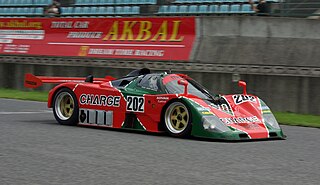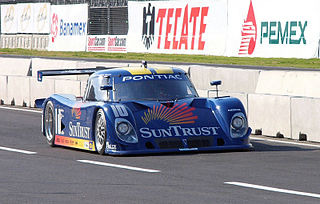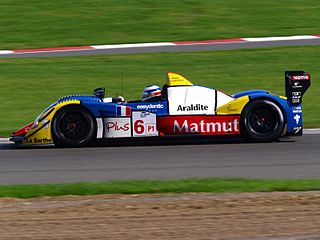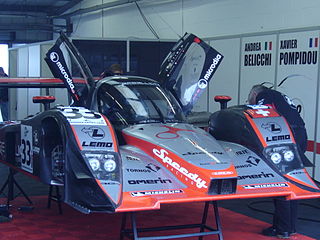
Mazdaspeed is Mazda's in-house performance division. The company is a grassroots racing team in Japan. Now owned by Mazda Motor Corporation, they build production model vehicles, become involved in motorsports development, and offer performance parts and accessories.

The 24 Hours of Daytona, currently known as the Rolex 24 At Daytona for sponsorship reasons, is a 24-hour sports car endurance race held annually at Daytona International Speedway in Daytona Beach, Florida. It is run on a 3.56-mile (5.73 km) combined road course, utilizing portions of the NASCAR tri-oval and an infield road course. Since its inception, it has been held on the last weekend of January or first weekend of February as part of Speedweeks, and it is the first major automobile race of the year in the United States. It is also the first race of the season for the WeatherTech SportsCar Championship.

The Mazda 787 and its derivative 787B are Group C sports prototype racing cars that were developed by Japanese automobile manufacturer Mazda for use in the World Sportscar Championship, All Japan Sports Prototype Championship, and the 24 Hours of Le Mans from 1990 to 1991. Designed to combine a mixture of the Fédération Internationale du Sport Automobile (FISA) Group C regulations with the International Motor Sports Association (IMSA) GTP regulations, the 787s were the last Wankel rotary-powered racing cars to compete in the World and Japanese championships, using Mazda's R26B engine.

The Mazda 767/767B are prototype racing cars that were built by Mazdaspeed for the 24 Hours of Le Mans running under the IMSA-spec GTP class. The 767 replaced the 757 in 1988, upgrading to a newer and larger 4-rotor 13J Wankel engine which produced nearly 600 hp (450 kW).

The Mazda 737C is a prototype racing car that was built for Mazdaspeed for the 24 Hours of Le Mans under the Group C2 formula. It was the final evolution of the initial Mooncraft built design dating back to the 717C. It again used a 2-rotor 13B Wankel engine.
The Mazda 727C is a prototype racing car that was built for Mazdaspeed for the 24 Hours of Le Mans in the Group C2 class. It replaced the 717C in 1984 as an evolution of the Mooncraft-built design, and used the same 2-rotor 13B Wankel engine as the previous model.
The Mazda 717C is a prototype racing car built for Mazdaspeed for the 24 Hours of Le Mans under the Group C Junior formula. It was the first sportscar built by Mazda since the ending of their running in GT with the RX-7 in 1982. It used a 2-rotor 13B Wankel engine, similar to the production engine in the Mazda RX-7. The bodywork and chassis were actually built by Mooncraft with assistance from Mazda.

Riley Technologies LLC is an American auto racing constructor and team specializing in the design and manufacture of complete race cars, as well as prototype development for racing and manufacturing applications.

The Toyota TS010 was a Group C racing car built by Toyota for the Sportscar World Championship, All Japan Sports Prototype Championship, and the 24 Hours of Le Mans.

Courage Compétition was a racing team and chassis constructor company now owned by Oreca, based in Le Mans, France near the Circuit de la Sarthe. It was founded by Yves Courage, a French race driver who ran hillclimbs before founding the company. Following the purchase of Courage by Oreca in 2007, Yves Courage has refounded the company as Courage Technology in 2010, attempting to develop electric racing cars.

The Jaguar XJR-14 is a sports-prototype racing car introduced for the 1991 World Sportscar Championship season. It was designed by Ross Brawn and John Piper, and was built and run by Tom Walkinshaw Racing (TWR), on behalf of Jaguar Cars.

The Mazda MXR-01 is a Group C sports prototype that was used by Mazda's factory team Mazdaspeed in the 1992 World Sportscar Championship season. It would be the final Mazda entry in sports car racing since the inception of its Le Mans project in 1983. It was based on the Jaguar XJR-14.

The Panoz Esperante GTR-1 was a race car developed by Panoz Auto Development and Reynard Motorsport for grand tourer endurance racing in 1997. Although named after the Panoz Esperante roadster, the GTR-1 actually bore no mechanical relation to the production Esperante, instead sharing only minor styling points. Only two road-legal GTR-1s were built to meet homologation requirements set forth by the ruling bodies which the racing cars ran under.
Advanced Engine Research, Ltd. is an auto racing engine manufacturer based in Basildon, Essex, England. Established in 1997, AER has developed winning engines for a number of high-profile international race series in sports car, prototype racing, rallying, touring car, and open wheel racing. They have designed engines derived from road car platforms, but their emphasis is on clean sheet designed engines with a focus on electronics and turbochargers. Their engines have raced in the 24 Hours of Le Mans, the World Endurance Championship (WEC), the European Le Mans Series (ELMS), the United SportsCar Championship (TUSC), GP3, British Touring Car Championship (BTCC), Nissan/Renault World Series, Grand-Am, Paris Dakar and FIA Sportscar Championship. They have worked with a number of manufacturers including Mazda, Ford, Hyundai, MG/Rover, Nissan, and Toyota. In 2012, AER developed and built Formula One turbo test engines to current rules and in July 2012, AER was chosen as engine partner and supplier to the new GP3 racing series.

Porsche has been successful in many branches of motorsport of which most have been in long distance races.

The Mazda RX-792P is a sports prototype racing car built for the IMSA GT Championship's GTP category for Mazda. Its career was short lived, with only two cars running in 1992 before the project was abandoned.

The Lola B08/80 is a Le Mans Prototype built by Lola Cars International. It is effectively the LMP2 version of the larger Lola B08/60; they are the first closed-cockpit sports prototypes built by Lola since the T92/10 of 1992. The B08/80 is optimised for the smaller engines and lighter weight of the LMP2 category in comparison to the larger and heavier B08/60.

OAK Racing is an endurance racing team specialising in sports prototypes based in Le Mans, France. In 2013 it won the 24 Hours of Le Mans in LMP2 class and the 2013 FIA WEC World Champion drivers and teams on LMP2 class.

Champion Racing was a sports car racing team based in Pompano Beach, Florida, USA. Founded in 1994 by Dave Maraj, a former rally driver from Trinidad, as the motorsport wing of the Champion Motors car dealership, the team has campaigned various Porsches and Audis in North American road racing series. Champion Racing's extensive record includes a win at the prestigious 24 Hours of Le Mans in 2005, and 5 straight American Le Mans Series LMP1 championships, 2 as a private team and 3 as a factory team under the name Audi Sport North America.
The 2017 IMSA SportsCar Championship was the 47th season of the International Motor Sports Association (IMSA) GT Championship that traces its lineage to the 1971 IMSA GT Championship. It was the fourth season of the United SportsCar Championship and second under the name as the WeatherTech SportsCar Championship. It began on January 28 with the 24 Hours of Daytona, and ended on October 7 with the Petit Le Mans.

















